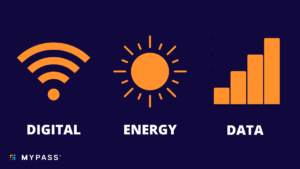People love to offer their perspective at the start of each new year on what the biggest trends, opportunities, challenges and changes to the industry will be. Some should be paid attention to, some less so.
We’ve brought together the various trends predicted in 2020 for the resources sector by seeking out the opinions of global experts. Specifically, we compare Ernst & Young, BDO & Deloitte. BDO summarised these trends into a quote that brings together the three that stand out to us most:
“We believe that to prepare for success in 2020 and beyond…companies must strive to become “Lean, Green, Digital” machines.”

#1 Investment in technology and digital will boom
This trend is expected to really take off as we enter the new decade. BDO’s Energy 2020 Vision: Oil & Gas report expresses the belief that companies will move away from overall spending in Research & Development, such as internally developing their own products and services. Instead, the industry is moving towards investment in exploration and production (E&P) related tech. The first trend presents an opportunity for fee-for-service technology-based companies like MyPass®. These companies who have developed complex products that offer far greater value both efficiently and financially can fill the expensive space left as companies move away from trying to develop these systems internally. If you'd like to read more, we discussed the disillusionment some companies have towards the costs of this process with our Head Developer, Peter Vostan.
EY bumped Future of Workforce right up to number two in their Top 10 Business Risks & Opportunities 2020 for mining and metals. Their reasoning comes down to the potential of digital and technological innovation to improve “productivity, safety and environmental management in the mining industry”. Digital came in at number three on the list and is described as a popular topic that top executives are wanting to discuss. To us, it speaks to the slow awakening that is happening across the resources industry to move away from outdated practices such as the use of Excel spreadsheets. 2020 is being picked as the moment for the evolution of the industry to really take hold and become truly based in digital.
#2 Energy transition will continue to gain momentum in 2020
This shouldn’t be something surprising to people, however, the way the energy industry is transitioning away from fossil fuels will be interesting to watch. Deloitte’s ‘2020 oil, gas and chemical industry outlook’ speaks about how the energy transition is a long-term trend that’s gaining a particularly greater focus in 2019 that they expect will continue to grow in 2020. They believe companies should have their eyes on the horizon, decades ahead, to allow themselves to thrive in the future by making decisions now that anticipate “disruptive change” rather than remaining reactive. They also provided this advice specifically for Oil & Gas companies looking to get ahead of the energy transition trend:
- First, companies should identify low-hanging fruit for reducing greenhouse gas emissions like eliminating methane leaks from existing infrastructure.
- Second, a few have deployed renewables to reduce emissions from field operations; more companies should follow suit.
- Third, CO2 enhanced oil recovery could be an avenue to boost production while sequestering carbon, but it remains a niche industry today — more companies should evaluate such opportunities.
- Lastly, freshwater use and wastewater disposal continue to challenge shale producers; more should invest in the infrastructure to sustain operations not just in 2020 but for years to come.
BDO has gone as far as predicting that a Global Energy Trade will see LNG and solar “bring electricity to four in five African people” and that in regards to mining, “By 2020, renewables will account for one-quarter of the world’s electricity generation as dependence on coal wanes.”
Despite these predictions, EY is assured that the global pressure to transition to a low-carbon economy is continually increasing. They’ve prioritised renewable energy, electrification of mines and focusing on Scope 3 emissions as the top minimisation strategies to reduce the carbon footprint, ranked fourth in their Top 10 list.
#3 The Democratisation of data
The amount of data that organisations within the resources sector hold are almost unfathomable. What people are expecting from 2020 is greater efforts to glean valuable insights from this data that can be applied back into business strategies. BDO predicts that for Oil & Gas “the average E&P company will make use of 10 per cent of its big data — up significantly from today, but nowhere near full potential.” This will involve placing data sensors on all equipment and every location possible to continue building bigger data resources.
Workforce and compliance management requires secure, efficient and practical management of data. Most major companies in the resources sector still store massive amounts of worker information on colossal Excel spreadsheets. They may also use systems that do not 'talk to each other' meaning the same data is doubled-stored in various locations on different systems. MyPass®’s 'single source of truth' strategy makes these processes redundant, placing all the relevant data in a singular location so it can be used for all relevant purposes from recruitment to compliance and onboarding.


